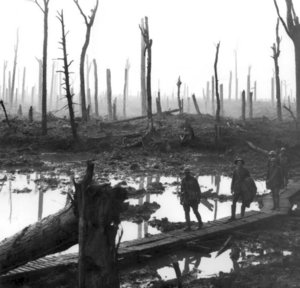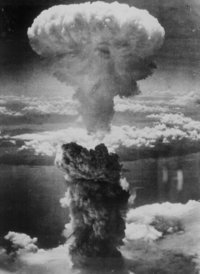World war
|
|
A world war is a military conflict affecting the majority of the world's countries. World wars usually span multiple continents, and are very bloody and destructive.
The term is usually used to refer to World War I (1914–1918) and World War II (1939–1945). Both wars involved some degree of participation from most of the world's existing countries, especially through the colonial empires of Britain, France, Germany, Italy and Japan, besides the United States and Russia. There has also been discussion of a so-called World War III, either as a theoretical possibility or science fiction scenario or as referring to an actual event (e.g. the Cold War).
Other wars in earlier periods that saw conflict across the world have been considered world wars by some, including the Seven Years' War (1756–1763; Winston Churchill called it "the first world war" in his A History of the English Speaking Peoples), the French Revolutionary Wars (1792–1802) and the Napoleonic Wars (1803–1815).
Since the conclusion of World War I, called the "war to end all wars", international organisations have been developed to attempt to prevent the outbreak of new wars. The League of Nations was established after World War I, and collapsed with the outbreak of World War II, after which the United Nations was formed.
Classification as a world war
The specific qualities that make up a world war are open to debate, however, the following are a reasonable set of criteria:
Alliances
Normally, there are groups of nations on each side in two alliances or distinct groups.
In the American Revolutionary War, the sides were aligned between the United States, France, Spain and the Netherlands against Great Britain and minor German States. The Great War of 1914-1918, the sides were aligned between Japan, China, Brazil, Cuba, United States, British Empire, France, Arabian Empire, Serbia, Montenegro, Luxembourg, Italy, Romania and the Russian Empire against the German Empire, Austria-Hungary, Bulgaria, Croatia and the Ottoman Empire.
Happened on more than one continent
The Great War of 1914-1918 was fought in China, The Pacific Ocean, Arabia, Africa and the North Atlantic as well as Europe. The Seven Years War (1754-1763) was fought in India, and North America as well as Europe. The Second World War of 1931-1945 was fought first in China, and then later in Greenland, Alaska, off the coast of Argentina, and in Africa, Arabia and North America as well as Europe and the Pacific Ocean.
Great numbers of deaths
A World War is also charictarized by the great number of deaths, often both military and civilian. The Second World War is an extreme example of this: lowest estimates put the death count at forty million, including many Russian or Chinese civilians, and nearly ten million killed in the Holocaust. Although earlier wars do not exhibit such great numbers, seen in the light of the world's population at the time, they were extremely destructive.
Candidates for the title of "World War"
With the definition of a world war so flexible any list of world wars is somewhat subjective and could include just two wars (World War I and World War II) or as many as eleven. The following briefly outlines potential world wars:
War of the League of Augsburg (1688–1697)
The War of the League of Augsburg was fought by Palatinate, Bavaria, Brandenburg, Spain, Sweden, United Provinces, and England against France, and to a degree the Ottoman Empire. The war was fought in North America and Europe.
War of the Spanish Succession (1701–1714)
The War of the Spanish Succession was fought by Great Britain, Spain, German and Italian States against France.
This war was fought in Europe and North America.
War of the Austrian Succession (1740–1748)
The War of the Austrian Succession was fought by Prussia, Great Britain Austria, Sardinia, Sweden and the Netherlands against France, Russia, Bavaria, Spain and Saxony.
The war was fought in India and North America as well as Europe.
Seven Years' War (1754–1763)
The Seven Years' War was fought by Great Britain, Prussia, Portugal and Hanover against France, Sweden, Spain, Austria, Saxony The Netherlands and Russia.
Churchill, in his history, called this the First World War.
Fighting occurred in India, the Philippines, North America, Africa and the Caribbean as well as Europe. This world war was also the first to not start in Europe. It started in the Ohio River Valley in present day United States.
American Revolutionary War (1775–1784)
The American Revolutionary War was fought by Great Britain, Madras, and minor German States against France, Kingdom of Mysore, The Netherlands, Spain, Sardinia and the United States of America.
French Revolutionary Wars (1792–1802)
The French Revolutionary Wars were fought by France and the Batavian Republic against Naples, Austria, Prussia, Great Britain, Sardinia, Portugal, The Netherlands, Spain, Belgium, Russian Empire and Ottoman Empire.
This World War was fought in Africa and Europe.
Napoleonic Wars (1803–1815)
The Napoleonic Wars were fought by France and the United States (non-allied with France) against Great Britain, Spain, Austria, the German states of the Holy Roman Empire, Sweden, The Netherlands, Saxony, Prussia, Russian Empire and Piedmont.
The United States of America did not support France at all, but the War of 1812 between it and the United Kingdom is considered part of the fighting of the greater war.
The war was fought in North America, Europe, Africa, South-East Asia, Atlantic Ocean, Pacific Ocean, and Indian Ocean.
This war was a series of wars, allied nations came in and out and not all remained for the duration of this world war. Many consider the Battle of Waterloo to be the last battle of this war.
World War I (1914–1918)

The First World War, also known as the Great War, was a world conflict occurring from 1914 to 1918. No previous conflict had mobilized so many soldiers or involved so many in the field of battle. Never before had casualties been so high. Chemical weapons were used for the first time, the first mass bombardment of civilians from the sky was executed, and some of the century's first large-scale civilian massacres took place. Four dynasties, the Habsburgs, the Romanovs, the Ottomans and the Hohenzollerns, who had roots of power back to the days of the Crusades, all fell after the war.
World War I proved to be the decisive break with the old world order, marking the final demise of absolutist monarchy in Europe. It would prove the catalyst for the Russian Revolution, which would inspire later revolutions in countries as diverse as China and Cuba, and would lay the basis for the Cold War standoff between the Soviet Union and the United States. The defeat of Germany in the war and failure to resolve the unsettled issues that had caused the Great War would lay the basis for the rise of Nazism, and thus the outbreak of World War II in 1939. It also laid the basis for a new form of warfare that relied heavily on technology, and would involve non-combatants in war as never before.
World War I became infamous for trench warfare, where huge numbers of troops were confined to trenches and could move little because of tight defenses. This was especially true of the Western Front. Over 9 million died on the battlefield, and nearly that many more on the home front due to food shortages, genocide, and ground combat.
World War II (1939–1945)

World War II was a global conflict that started on 7 July 1937 in Asia and 1 September 1939 in Europe and lasted until 1945, involving the majority of the world's states and every inhabited continent. Virtually all countries that participated in World War I were involved in World War II. It was the most extensive and costly armed conflict in the history of the World.
Attributed in varying degrees to the Treaty of Versailles, the Great Depression, nationalism, and militarism, the causes of the war are a matter of debate. On which date the war began is also debated, cited as either the German invasion of Poland on 1 September 1939, the Japanese invasion of China on 7 July 1937 (the start of the Second Sino-Japanese War), or earlier yet the 1931 Japanese invasion of Manchuria. Still others argue that the two world wars are one conflict separated only by a "ceasefire".
Fighting occurred across the Atlantic Ocean, in Western and Eastern Europe, in the Mediterranean Sea, Africa, the Middle East, in the Pacific and South East Asia, and it continued in China. In Europe, the war ended with the surrender of Germany on 8 May 1945 (V-E and Victory Days), but continued in Asia until Japan surrendered on 15 August 1945 (V-J Day).
Approximately 57 million people died as a result of the war, including acts of genocide such as the Holocaust. As a case of total war, it involved the "home front" and bombing of civilians to a new degree. Nuclear weapons, jet aircraft, and RADAR are only a few of many war-time inventions.
The Cold War
The Cold War, a series of conflicts between the United States and the Soviet Union after World War II, spanned six continents. The principal powers never attacked each other directly but supported opposing proxies in various foreign wars, notably the Korean War, the Second Indochina War, and the Afghan-Soviet War. Some analysts, such as Norman Friedman, have described it as World War III.
The War on Terror
The current wars (as of 2005) involving the United States, the United Kingdom, Iraq, and Afghanistan, are the subject of much debate over definition. For practical reasons some consider these to be part of a single larger conflict, the "War on Terror," which is the Third (or Fourth) World War. Others question whether the larger terrorism epidemic can properly be called a "war" at all, and suggest that one or both of the Iraq and Afghani wars are separate from that larger conflict.
As long as these conflicts have not reached their conclusion, and as long as their definition continues to be a matter of intense political interest, it is difficult to reach a definitive judgment on how they should be categorized, and whether they belong on the list of World Wars.de:Weltkrieg el:Παγκόσμιος Πόλεμος es:Guerra mundial eo:Mondmilito fr:Guerre mondiale io:Mondo-milito hu:Világháború nl:Wereldoorlog nds:Weltorlog ja:世界大戦 ro:Război mondial simple:World War sl:Svetovna vojna sv:Världskrig zh:世界大战
